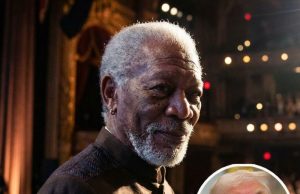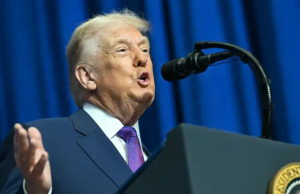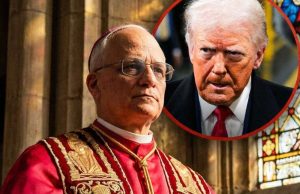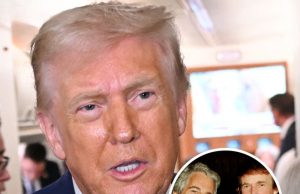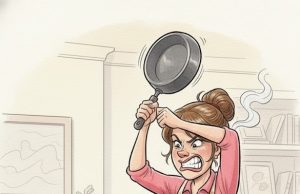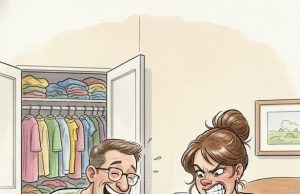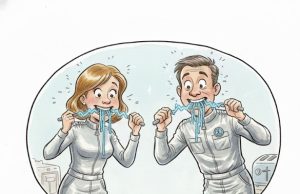
A poor girl, running late for school, finds an unconscious baby locked in a luxury car. She breaks the window and rushes the baby to the hospital. Upon arrival, the doctor falls to his knees, weeping.
The streets of Buenos Aires blazed under the relentless midday sun as Patricia Suárez, a young woman of just 16, ran desperately toward her school.
Her worn shoes pounded the pavement as she dodged passersby, knowing this would be her third tardy this week. The principal had made it clear: one more tardiness and she would have serious trouble keeping her scholarship.
“I can’t lose her,” she murmured between gasps, clutching the used books she had worked so hard to acquire to her chest. Her uniform, inherited from an older cousin, showed obvious signs of wear, but it was the best her family could afford. It was then, as she turned the corner onto Libertador Avenue, that she heard it.
At first, she thought it was her imagination, but the faint crying became clearer. It was coming from a black Mercedes parked in the blazing sun. Patricia stopped abruptly. Through the tinted windows, she made out a small figure in the back seat. The crying had faded to a faint whimper, barely audible. Without a second thought, she approached the vehicle. The car was sweltering, and there, in its car seat, a baby no more than six months old writhed weakly, its reddish skin glistening with sweat.
“Oh my God!” Patricia exclaimed, pounding on the window. She looked around for help, but the normally busy street seemed deserted. At that moment, The baby had stopped crying, and his movements were growing slower and slower. The decision was instantaneous. She grabbed a piece of rubble from the ground and, closing her eyes, smashed it against the back window. The glass shattered with a crash that seemed to echo throughout the street. The car alarms began to blare as Patricia, ignoring the cuts on her hands, reached through the broken window to grab the little one.
Her fingers trembled as she struggled with the car seat straps. The baby was barely responsive now, his eyes half-closed, his breathing shallow and rapid.
“Hang on, little one,” she whispered finally, freeing him.
She wrapped him in her own school jacket and, completely forgetting about school, her books scattered on the sidewalk, and the wrecked car, she ran toward the nearest hospital. The five blocks to San Lucas Clinic felt like the longest of her life. The weight of the baby in her arms seemed to increase with every step, while her lungs burned with the effort.
People moved aside as she passed, some shouting, others pointing, but Patricia could only focus on keeping pace, on not stumbling, on arriving on time. She burst into the emergency room like a storm, her uniform stained with sweat and blood from the cuts on her hands. “Help!” she cried, her voice breaking, “please, he’s in very bad shape.” The medical staff reacted immediately. A nurse took the baby from her arms as the doctors rushed to his aid. Amid the commotion, Patricia watched as one of the doctors, a middle-aged man, approached the little boy.
The doctor’s reaction was instantaneous. His knees buckled, and he had to lean on a stretcher to keep from falling.
“Benjamin,” the doctor whispered, tears streaming down his cheeks. “My son.”

Patricia felt the world stop. The baby she had just rescued was the doctor’s son.
Questions began swirling in her mind, but before she could process what was happening, two police officers entered the emergency room.
“Patricia Suárez,” one of them asked, approaching with a stern expression.
“We need you to come with us. There are reports of vandalism and a possible kidnapping.”
The doctor, regaining his composure, stepped between Patricia and the officers.
His voice, though trembling, was firm.
“This young woman just saved a life.”
“My son, and I need to know exactly how he got in that car.”
The next few hours became a whirlwind of questioning and revelations. Patricia sat in a small office inside the hospital, her hands now bandaged, trembling around a glass of water she had barely touched.
In front of her, Dr. Daniel Acosta, little Benjamin’s father, listened to her story for the third time while the officers took notes.
“Then, I just heard the crying as I walked by.”
“What happened?” asked the youngest officer, Lucas Mendoza. His gaze was skeptical.
“Yes,” Patricia replied, her voice tired but firm. “The car was in the sun, all the windows closed, no one around. I tried to get help, but I stopped, remembering the desperation of that moment.”
Dr. Acosta ran a hand over his face, clearly exhausted.
His son was stable now, responding well to treatment for the hyperthermia, but the circumstances leading up to this situation were becoming increasingly murky.
“My wife, Elena, left Benjamin with the nanny this morning,” the doctor explained, his voice cracking slightly. “Teresa Morales has worked for us for three months, impeccable references. When I called home after she brought Benjamin in, no one answered.”
The officers exchanged meaningful glances.
The Mercedes was reported stolen an hour ago, Officer Mendoza informed them.
Mrs. Acosta arrived home to find the back door forced open. The nanny was gone, along with some jewelry and important documents. Patricia listened, trying to process all the information. The nanny had tried to kidnap the baby. Why abandon him in the car? Something didn’t add up. “Dr. Costa,” Patricia interrupted timidly, “may I ask you something?” When the doctor nodded, she continued. The car where I found Benjamin was locked from the inside, as if someone had wanted to make sure no one could get him out.
A heavy silence fell over the room. Dr. Acosta paled visibly. “The locks on my Mercedes are automatic,” he muttered, more to himself than to the others. “They can only be activated with the key or the remote,” Officer Mendoza added, pulling out his phone. “We need to review the security camera footage from the area. Now.” As the officers left the office, Dr. Acosta slumped in his chair, his face a mask of worry and confusion. “Patricia,” he said gently.
“There’s something I need to confess to you, something that might explain all of this.” Patricia straightened up in her seat, noticing the change in the doctor’s tone. “Two weeks ago,” he began, “I received an envelope at my office. It contained photographs—photographs of Benjamin, of Elena, of our daily routines—along with a note telling me to stay away from a certain medical case.” “A medical case?” Patricia asked, sensing they were entering deeper waters. “I’m a key witness in a medical malpractice case against a very prestigious private clinic.”
“My testimony could shut the place down.” The doctor stood up and began pacing nervously around the small office. “I thought I could handle it. We increased security. I hired Teresa after thorough background checks.” But now a knock on the door interrupted their conversation. It was a nurse, her expression worried. “Dr. Costa, your wife is here, and there’s something you need to see.” Elena Acosta was an elegant woman who, even in distress, maintained admirable composure. However, when she saw Patricia, something in her expression changed.

“You’re the young woman who saved my baby,” she asked, her voice breaking as she reached out to hug her. Patricia, surprised by the gesture, could only nod. But it was what Elena said next that made everyone in the room freeze. “Teresa is dead,” Elena announced, pulling away from the hug. “The police just found her body in the trunk of her own car, a few blocks from our house.” Dr. Acosta slumped in his chair, stunned.
“Dead! But how come there’s more?” Elena continued, pulling a crumpled envelope from her purse. They found this in her pocket. It’s documents about the clinic, about the negligence cases. It seems Teresa was investigating on her own. Patricia watched the exchange, the pieces beginning to fall into place in her mind. The Mercedes, she said suddenly, making everyone look at her. Why leave Benjamin in the doctor’s Mercedes? Why not any other car? Dr. Acosta jumped up, a new understanding dawning on his face, because they wanted it to seem like he’d forgotten.
“A doctor who testifies about negligence, being negligent with his own child, would have been found too late,” Elena whispered, horrified. “Your credibility would have been destroyed.” “And Teresa found out,” Patricia finished. That’s why another knock on the door interrupted the conversation. It was Officer Mendoza holding a tablet. “You need to see this,” he said, playing a security video. It clearly showed two men intercepting Teresa near the Acosta home, forcing her into a vehicle.
Minutes later, the doctor’s Mercedes pulled out of the garage, driven by one of them. “We’ve identified one of the suspects,” Mendoza reported. “He worked as a security guard at the clinic that’s under investigation.” Dr. Acosta took his wife’s hand, his face a mixture of pain and determination. “This goes beyond a simple case of negligence,” he said. “And thanks to you, Patricia, they didn’t achieve their goal.” Patricia looked at her bandaged hands, thinking about how a simple academic setback had put her at the center of something much bigger.
“What happens now?” she asked. “Now,” Officer Mendoza replied. “We need to keep everyone safe while we unravel this conspiracy.” Ya added, looking specifically at Patricia. “I think we should talk to your school about your absence today. After all, you saved a life.” Elena approached Patricia again, this time with a more serene expression. “You didn’t just save my son,” she said gently. “I think you’ve helped expose something that could save many more lives.” At that moment, as if to confirm his mother’s words, Benjamin’s crying was heard from the next room.
A loud, healthy cry that made everyone in the office smile, reminding them how close they had come to losing everything. Patricia allowed herself to relax for the first time since she had seen that black Mercedes. The questions kept coming, the implications of what they had discovered were enormous, but for now, Benjamin’s crying was all she needed to hear to know she had done the right thing. Night had fallen over the city when Patricia finally returned home, escorted by a police officer.
Her mother, Ana, was waiting for her at the door, her face a mixture of worry and relief. The school had called to report her absence, but news travels fast in the neighborhood, and rumors about what had happened had already reached her ears. “My brave girl,” Ana whispered, hugging her daughter as the officer briefly explained the situation and the need to maintain discretion regarding the day’s events. Inside the modest house, Patricia sat at the kitchen table, watching her mother prepare mate.
The familiar ritual helped calm her, though the images of the day continued to replay in her mind. “The principal called again,” Ana mentioned casually as she poured the drink. “After learning what you did, she not only withdrew the warning about your tardiness, but she wants to see you tomorrow in her office.” Patricia nodded distractedly, her thoughts still at the hospital, with little Benjamin, and the terrible conspiracy she had helped uncover. The sound of her phone startled her.
It was a message from Dr. Acosta. “Teresa left a letter. We need you to come to the hospital tomorrow. There’s more to it than we thought.” The next morning dawned gray and threatening. Patricia arrived early at the school, where the principal, against all odds, greeted her with a hug and words of admiration. However, the biggest surprise came when she was informed that Dr. Acosta had arranged a full scholarship for her in recognition of her actions. “Your bravery not only saved a life,” the director said, “but also demonstrated exceptional character.
The doctor insisted that you deserve this opportunity.” With a heart full of mixed emotions, Patricia headed to the hospital after school. At the entrance, she met Elena, who was waiting for her with a serious expression. “Threats have been coming in,” Elena explained as they walked toward the doctor’s office. “But what we found in Teresa’s letter is even more disturbing.” In the office, Dr. Acosta and Officer Mendoza were waiting for them. On the desk was a handwritten letter and several documents scattered about.
“Teresa wasn’t just a nanny,” the doctor began, his voice tired but firm. She was an investigative journalist. She’d been following cases of medical malpractice for months, connecting the dots that no one else had noticed. Patricia took a seat as Officer Mendoza unfolded photographs and documents. The clinic wasn’t just negligent, he explained; it was part of a medical fraud ring. They falsified results, performed unnecessary procedures, all for money. “Why hire Teresa as a nanny?” Patricia asked, though she already suspected the answer.
“Because he knew I was investigating the case,” Dr. Acosta replied. “He wanted to protect us, to be close. In his letter, he explains that he discovered a plan to discredit me, but he didn’t expect them to act so quickly or so brutally.” Elena, who had remained silent, took the letter with trembling hands. She knew she was in danger. The night before all this, she left a flash drive hidden in our house with all her evidence. Officer Mendoza leaned forward. “Where is that flash drive now?”
“That’s the problem,” Elena replied. “We couldn’t find it, and according to the letter, he hid it in the place where secrets sleep, but never truly rest.” Patricia felt a chill run down her spine. “Benjamin’s room,” she whispered. “That’s not it. Babies sleep, but they never truly rest.” Elena’s eyes lit up with understanding. “The crib, of course. Teresa used to spend hours there singing to Benjamin.” Officer Mendoza stood up immediately. “We need to go to her house now.”
If they decipher this too. He couldn’t finish the sentence. A loud crash in the hallway startled everyone. The door burst open and a nurse rushed in. “Dr. Costa, your house is on fire!” The next few minutes were a chaotic mix of sirens and frantic running. By the time they arrived at the Acosta residence, firefighters were already battling the blaze. “The fire seemed to be concentrated specifically in the bedroom area, Benjamin’s room,” Elena murmured in horror as the firefighters worked.
Patricia noticed something odd. A man in civilian clothes was watching the scene from the corner with unnerving interest. When their eyes met, he turned quickly and started walking away. “Officer Mendoza!” Patricia called, pointing at the fleeing man. The officer reacted immediately, chasing the suspect while calling for backup on his radio. Amid the chaos, Patricia remembered something she had seen in Benjamin’s room during her brief visit the day before. Something that had seemed strange at the time, but now made sense.
“The musical mobile,” she exclaimed suddenly, turning to Elena. “Teresa always wound it up before putting it to bed, right?” Elena nodded, confused. Yes, it was part of her routine. She said it was the only mobile she had ever seen with such a large music box. “Because it wasn’t just a music box,” Patricia added as the firefighters finally gave the go-ahead to enter. to the house. In Benjamin’s charred room, hanging crookedly over the burned crib, the musical mobile remained intact, protected by its metal casing.
When Officer Mendoza returned, after his colleagues had apprehended the suspect, he found Dr. Acosta carefully unscrewing the base of the toy. Inside, perfectly hidden, was the flash drive. Teresa thought of everything, the doctor murmured, holding the small plastic piece as if it were the most valuable treasure in the world. She hadn’t known anyone would suspect a baby toy. While Officer Mendoza secured the evidence, Patricia surveyed the destruction around them. The fire had clearly been intentional, aimed specifically at destroying this room and any evidence it might contain.
“They didn’t count on Teresa being so smart,” Elena said, placing a hand on Patricia’s shoulder. “Nikon, that a young student would have the courage to break a window to save my son.” Officer Mendoza approached them, his expression serious but hopeful. “The man who tried to flee worked for the clinic. He’s already confessing.” With that, he lifted the flash drive and his Testimony. We can end the whole operation. Patricia looked around once more, thinking about how a simple act of bravery had triggered so much.
Dr. Acosta approached her, his face showing a mixture of gratitude and determination. “There’s something else you should know,” he said gently. Teresa left specific instructions in her letter. About you. Patricia felt her heart stop for a moment. About me, but she didn’t even know me. No, the doctor confirmed, but somehow she knew someone like you would appear, someone with the courage to do the right thing regardless of the consequences. In the Acostas’ living room, partially affected by smoke but still habitable, Patricia sat across from Dr. Acosta, Elena, and Officer Mendoza.
The envelope containing Teresa’s last words rested on the coffee table between them. “Teresa wrote this the night before she died,” Dr. Acosta explained, pulling a sheet of paper from the envelope as if he knew what was about to happen. Elena took the letter with trembling hands and began to read. “If you are reading this, it means my suspicions were correct and I am no longer with you. But it also means that someone, a brave soul, managed to save Benjamin from the trap you were trying to set.
To that person, whoever you are, I need to ask you one last favor.” Patricia felt a chill run down her spine as Elena continued reading. “In my investigations, I discovered that the medical negligence network is just the tip of the iceberg. They have been experimenting with unapproved treatments, using desperate patients as guinea pigs—poor families, people without the resources to defend themselves legally. The evidence is on the flash drive, but also elsewhere.” Officer Mendoza leaned forward, his professional interest clearly piqued.
“I have been documenting everything,” the letter continued. “Testimonies, invoices, altered medical records, but my most important discovery is hidden in the…” The last place they would look was the municipal cemetery. A heavy silence fell over the room. “Teresa was known to visit the cemetery frequently,” Elena explained gently. “She said she was visiting her mother’s grave, but that wasn’t true,” Dr. Acosta added. “She was gathering evidence.” Patricia recalled something she had seen on the news months earlier: the cemetery gardeners. There hadn’t been a protest because they had all been fired suddenly.
Officer Mendoza nodded, pulling out his phone to take notes. “They were replaced with personnel from a private security company—the same company that provides security for the clinic,” Dr. Acosta added, his face darkening. Teresa’s letter continued: “To whoever saved Benjamin, you have something I didn’t have. Your act of bravery has placed you above suspicion. No one would question your presence in the cemetery visiting a loved one. At grave 342, section D.”
Beneath Maria Gonzalez’s gravestone, you’ll find a sealed package. It’s my life insurance, or in this case, my death insurance. Patricia felt the weight of their stares upon her. “Do you want me to?” “We can’t officially send the police,” Mendoza explained. “The security company is watching our every move, and we,” he gestured to Dr. Acosta and Elena, “would be recognized immediately.” “But a student visiting a grave,” Patricia murmured, understanding Teresa’s plan. “You don’t have to do it,” Elena said quickly.
“You’ve already risked too much for us.” Patricia looked at Dr. Acosta’s hands, which were firmly holding his wife’s. She thought of Benjamin, safe in the hospital, and all the other families who might be suffering without knowing it. “I’ll do it,” she said finally, “but I’ll need help.” The plan unfolded quickly. Patricia would visit the cemetery the next day, after school. She would bring flowers like any other visitor. Officer Mendoza would be nearby, in plainclothes, monitoring the situation. Elena provided her with a simple black dress, something a teenager would wear to visit a relative’s grave.
That night at home, Patricia couldn’t sleep. Her mother, after hearing the plan, had tried to dissuade her, but had finally understood the importance of what was at stake. “Your father would be proud,” Ana had said, kissing her daughter’s forehead. He always said that true courage lies in doing the right thing, even when you’re afraid. The next morning dragged on. At school, Patricia could barely concentrate in class. Her hands sweated as she held her pencil, her mind replaying the memorized instructions over and over.
When the last bell finally rang, Patricia went to the bathroom to change. Elena’s black dress was a little too big, but it would do the job. In the mirror, she barely recognized the young woman staring back at her. The municipal cemetery was a vast and ancient place, with centuries-old trees casting long shadows on the gravestones. Patricia entered through the main gate, the bouquet of flowers clutched to her chest. He immediately noticed the security guards dressed in black patrolling the trails.
Following her memorized directions, she headed toward section D. Her shoes crunched softly on the gravel as she walked among the graves, pretending to search for a particular one. A guard watched her with interest as she passed by, but Patricia kept up her act, occasionally pausing to read the headstones as if looking for a specific one. Finally, she reached grave 342. Maria Gonzalez’s headstone was simple, unadorned. Patricia knelt before it, carefully placing the flowers. Her fingers trembled as she began to discreetly explore the edges of the headstone.
“Do you need any help, young lady?” The voice startled her. A security guard had silently approached from behind. Patricia felt her heart stop, but she maintained her composure. “No, thank you,” she replied, her voice cracking. “I just miss my grandmother.” The guard nodded sympathetically but didn’t move. Patricia could feel his gaze on her as she pretended to pray. It was then that she heard another voice, this time more distant. Sir, we need help at the main entrance. The guard hesitated for a moment before quickly walking away.
Patricia knew this was her chance. With nimble fingers, she located the hidden compartment Teresa had described in her letter. Inside, she found a sealed package about the size of a book. Without wasting a second, she slipped it into her bag and stood up, wiping away the tears she hadn’t realized she’d shed. As she walked toward the exit, she saw Officer Mendoza arguing heatedly with the guards about an alleged flower theft. The distraction had worked perfectly.
Once on the street, Patricia kept a steady pace until she turned the corner. Only then did she allow herself to run, her heart pounding so hard she thought it would burst from her chest. Dr. Acosta and Elena were waiting for her at a café a few blocks away. When Patricia walked in, pale and trembling, they both jumped up. “Did you get it?” Elena whispered. Patricia nodded, carefully removing the package from her bag. Dr. Acosta took it with trembling hands and began to open it.
Inside were a notebook, a USB drive, and several photographs, but what caught everyone’s attention was a final letter written in Teresa’s unmistakable handwriting. “If you’re reading this, it means you found someone with the courage to retrieve him. And it also means I’m right about who’s really behind all this.” Dr. Acosta’s hands trembled as he held Teresa’s letter. The café around them continued operating normally, oblivious to the drama unfolding at that corner table.
Patricia, Elena, and Officer Mendoza, who had just arrived, held their breath as the doctor read aloud. “The real mastermind behind all this isn’t the clinic. It’s someone everyone knows and respects, someone who has been using his position to cover up these crimes for years: Dr. Carlos Montiel, director of the municipal hospital.” Elena choked back a gasp. Dr. Acosta visibly paled. Carlo whispered, “But he’s my mentor, the man who taught me everything I know.”
Patricia watched the scene silently, recalling the times she had seen Dr. Montiel on the local news, always smiling, always talking about improvements to the healthcare system. Teresa continued in her letter. “Montiel has been diverting vulnerable patients to the private clinic for years. Patients without resources, without family to ask too many questions, are promised free experimental treatments, but in reality, they are used to test unapproved medications. I have documented more than 50 cases in the last two years.”
Officer Mendoza frantically took notes as Dr. Acosta continued reading. “On the USB drive, you’ll find all the records: bank transfers, emails, altered medical histories, but the most important thing is in the photographs.” With trembling hands, Elena pulled the photographs from the envelope. They were secretly taken pictures. Dr. Montiel meeting with pharmaceutical executives, documents being destroyed late at night, patients being secretly transferred between hospitals. “That’s why they tried to discredit you,” Patricia murmured, the pieces falling into place.
“Because your testimony about the negligence could have led to all of this being uncovered. And that’s why they used Benjamin,” Elena added, her voice breaking. “They knew exactly how to hit you where it would hurt the most.” Dr. Acosta ran a hand over his face, looking suddenly exhausted. “Carlos was the one who recommended Teresa as a nanny. He said she was the niece of a colleague who needed the job while he was studying.” “We need to get this to higher authorities immediately,” Officer Mendoza interrupted. “But we’ll have to be extremely careful.” Montiel has powerful connections.
As if on cue, Dr. Acosta’s phone began to ring. The name on the screen made everyone hold their breath. “Dr. Carlos Montiel,” Mendoza whispered, pulling out his own recorder, putting it on speakerphone. Dr. Montiel’s voice sounded casual, almost cheerful. “Daniel, son, I heard what happened to little Benjamin. What a terrible scare! Thank goodness that young woman was there to help. By the way, have you heard from Teresa? It’s very strange that she disappeared like that.”
Dr. Acosta maintained his composure admirably. “No, no news. The police are investigating.” “Of course, of course. Daniel, how about we have dinner tonight? Like old times, we have a lot to talk about.” Eyes met at the table. It was a trap, clearly, but also an opportunity. “I’d love to, Carlos,” replied Dr. Acosta, “at our usual restaurant.” “Perfect, at 8. Come alone.” “Yes, like old times.” When the call ended, the silence at the table was deafening.
“It’s a trap,” Elena said immediately. “Daniel, you can’t go.” “He has to go,” Mendoza countered, “but he won’t be alone.” “Can we set up an operation?” “No,” Patricia interrupted suddenly. Everyone looked at her in surprise. “If they set up a police operation, he’ll…” She’ll know. She has eyes everywhere. We need something more subtle. The next few hours were a frenzy of preparations. The plan was risky, but it might work. Patricia insisted on participating despite everyone’s protests. “I’m already involved,” she argued. “Besides, no one will suspect a high school student.” By 7:45 p.m., the elegant El Dorado restaurant was buzzing with activity.
Patricia, dressed in the waitress uniform they had borrowed, moved among the tables with ease, thanks to her experience working weekends at her aunt’s café. Dr. Acosta arrived promptly at 8:00 and was shown to a private table in the far corner of the restaurant. Minutes later, Dr. Montiel made his entrance. Patricia approached to take the order, her phone in her apron pocket recording every word. Officer Mendoza and his team waited in a van around the corner, monitoring the situation through a hidden microphone.
“Daniel, my boy,” Montiel began, his voice paternal, but with a barely perceptible edge. “I’m worried you’re getting involved in things that aren’t your business.” “What do you mean? Carlos, come on, son. The irregularities at the clinic, the investigation—is it really worth risking everything for this? Your career, your family.” The veiled threat nearly made Patricia spill the wine she was pouring, but she kept her composure, shifting discreetly to get a better look at the audio. “It’s curious that you mention my family,” Dr. Acosta replied, his voice controlled, especially after what happened with Benjamin.
“A terrible accident,” Montiel sighed. “These things happen. Children are just as vulnerable as the patients you’ve been sending to the clinic.” The ensuing silence was icy. Patricia, pretending to wipe down a nearby table, held her breath. “Careful, Daniel.” Montiel’s voice had lost all trace of kindness. “Don’t make accusations you can’t prove.” “Oh, but I can try them,” Dr. Acosta replied, pulling an envelope from his jacket. Teresa had left a gift before she died. Montiel’s face transformed for an instant, his entire facade of kindness vanishing to reveal something dark and dangerous.
Where’s the rest? Safe. Just like all the copies we’ve distributed, Patricia saw Montiel’s hand move toward his jacket—the signal they’d been waiting for. Now he screamed, dropping the tray. It all happened in seconds. Officer Mendoza and his team stormed into the restaurant. Montiel tried to pull something from his jacket, but two officers already had him subdued. “Dr. Carlos Montiel,” Mendoza announced, “you are under arrest for conspiracy, criminal negligence, and the murder of Teresa Morales.”
The diners watched in astonishment as the respected hospital director was handcuffed. Patricia approached Dr. Acosta, who seemed to have aged ten years in those minutes. “It’s over,” she whispered, placing a hand on his shoulder. As Montiel was led toward the exit, he stopped in front of them. “You’re just like your father, Daniel,” he spat contemptuously. “He also thought he could change things. Remember what happened to him?” Dr. Acosta went pale. Patricia looked at him, confused, but before she could ask anything, Elena rushed into the restaurant.
Daniel, Benjamin is having seizures. The doctors don’t know what’s wrong with him. Montiel’s smile, as he was shoved toward the police car, chilled Patricia to the bone. This wasn’t over. In fact, it seemed like it was just beginning. The hospital was a hive of activity when they arrived. Dr. Acosta ran straight to the emergency room, where a team of doctors surrounded Benjamin’s small, convulsing figure. “His vital signs are dropping,” a nurse shouted. “We need a full toxicology screen now,” Dr. Acosta ordered.
Putting on gloves with trembling hands, Patricia watched from the doorway as her heart pounded wildly. Elena stood beside her, clinging to the doorframe as if it were the only thing keeping her upright. “This isn’t normal,” Dr. Acosta murmured, examining Benjamin’s eyes. “I’ve seen these symptoms before.” Suddenly, a horrible realization crossed his face. The day my father died. “Your father?” Elena asked, her voice barely a whisper. “He was a doctor, too,” he replied, without taking his eyes off Benjamin.
“He was researching the side effects of experimental medications. The night he died, he had the exact same symptoms.” Patricia felt a chill run down her spine, remembering Montiel’s words in the restaurant. “Dr. Acosta, your father. Everyone said it was a heart attack,” he interrupted, his voice tense. “But now I need to see today’s visitor logs. Who has been in this room?” A nurse rushed to get the log while they continued to stabilize Benjamin. Patricia approached the bed, watching the monitors displaying the little boy’s vital signs.
“Wait,” she said suddenly, pointing to a mark on Benjamin’s arm. It hadn’t been there before. Dr. Acosta bent down to examine the small, needle-like mark. Just then, the nurse returned with the log. Only authorized personnel were allowed in, and there had been a visit from the maintenance department—something about checking the air conditioning. Maintenance. Elena frowned. No one had ordered any checks. The uniform, Patricia whispered, remembering something. When we arrived, I saw someone leaving in a maintenance uniform.
They seemed to be in a hurry. Dr. Acosta moved with renewed urgency. “I need a blood sample and someone to check the security cameras.” Now, while the team worked, Patricia noticed something on the windowsill—a small, empty vial, almost invisible behind the curtain. She carefully picked it up with a tissue. “Doctor, Acosta.” The doctor took the vial, examining it in the light. His eyes widened with recognition. “It’s the same component they found in my father’s body.”
“Can you treat him?” Elena asked, her voice trembling. “Yes,” he replied firmly, “because I’ve spent the last 15 years secretly researching this poison. I knew that one day they would try to use it again.” The next few minutes were a race against time. Dr. Acosta worked with mechanical precision, administering the antidote he had developed while studying his father’s death. Gradually, Benjamin’s convulsions began to subside. “Doctor,” Officer Mendoza called from the doorway. “We have the security footage, and there’s something else you need to see.” In the hospital’s small security room, they reviewed the recording.
The man in the maintenance uniform was clearly visible, entering Benjamin’s room. When he turned toward the camera, Elena gasped. “It’s Roberto,” Dr. Acosta whispered, “my father’s former assistant, the one who disappeared after his death. We found him,” Mendoza confirmed. “He was trying to leave town, but there’s more. He had this with him.” On the table, Mendoza unfolded a set of old documents. They were records of experiments dated 15 years prior, signed by Dr.
“Montiel and Dr. Acosta’s father. His father discovered they were using patients to test experimental drugs,” Mendoza explained. “When he threatened to expose them, Montiel ordered their elimination. Roberto was the one who carried it out.” “And now they tried to do the same to Benjamin,” Patricia murmured, the pieces falling into place. “Not just Benjamin,” Mendoza corrected. Roberto confessed, “The plan was to eliminate the entire family. The poison, in smaller doses, was in the water they drank at home. That’s why Teresa started to suspect something.”
She noticed initial symptoms in everyone. Elena covered her mouth with her hands in horror. That’s why she offered to babysit. “To protect us,” Dr. Acosta finished, his voice breaking, and it cost him his life. In Benjamin’s room, the little boy was finally sleeping peacefully, his breathing regular and strong. Patricia watched from the doorway as Dr. Acosta held his son’s hand, tears streaming down his face. “My father’s legacy,” he whispered. “All these years I thought he had died in vain, but his research saved my son, and thanks to Teresa, we can finally see justice done.”
Elena approached Patricia and hugged her tightly. “And thanks to you for having the courage to break that glass. If it weren’t for you, we would never have discovered the truth.” Patricia smiled gently, thinking about how a simple act of bravery had unraveled a 15-year-old conspiracy. Outside, the sun was beginning to rise on the horizon, promising a new day and with it, the long-delayed hope for justice. But as she watched little Benjamin sleep, Patricia couldn’t help but wonder if it was really all over or if there were more secrets. waiting to be discovered.
A month after the events at the hospital, Patricia sat in the courtroom, listening as the judge pronounced sentence against Dr. Montiel and his accomplices. Elena held a healthy Benjamin in her arms as Dr. Acosta squeezed his wife’s hand for the charges of conspiracy, criminal medical negligence, and the murders of Teresa Morales and Dr. Jorge Acosta. “This court finds Carlos Montiel guilty,” the judge said. His words carried a weight that seemed to close a dark chapter in the lives of everyone present.
Roberto, the former assistant, had confessed everything, providing evidence that went back decades of illegal experiments and cover-ups. After the sentencing, as they left the courthouse, Dr. Acosta stopped in front of Patricia. “My father always said that true medicine isn’t in the treatments, but in the hearts of those who care for others,” he said, his voice heavy with emotion. “You proved that the day you saved Benjamin.” Patricia smiled, remembering that moment that seemed So distant now.
I only did what anyone would have done. No, Elena interrupted, gently rocking Benjamin. You did what few would have dared to do. And that led us to discover the truth, not only about what happened to Benjamin, but about Daniel’s father, about Teresa, about all the patients who suffered in silence. Officer Mendoza, who had approached them, added, “The investigations continue. Every day we find more cases, more families who deserve justice.” And it all started because a student decided to break a window to save a baby.
Patricia looked at her mother, Ana, who had been by her side throughout the entire process. Dad always said that true courage lies in doing the right thing, even when you’re afraid, she recalled. And he would be incredibly proud of you, Ana replied, hugging her daughter. At that moment, Dr. Acosta took an envelope from his briefcase. Speaking of doing the right thing, Elena and I have been talking. The scholarship is just the beginning. We want to help you fulfill your dream.
Patricia took the envelope with trembling hands. Inside was an acceptance letter for a special medical program. But how did they know? Elena smiled. Teresa mentioned it in her last letter. She said you had spoken of your desire to be a doctor during one of her visits to the cemetery. She believed in you, and so do we. The program is intensive, Dr. Acosta explained. You will have to study hard, but I am sure you will be an excellent doctor, someone who not only heals bodies but also cares for people.
Tears streamed freely down Patricia’s cheeks as she clutched the letter. Her mother wept beside her, proud and moved. Benjamin, from Elena’s arms, reached out his small hands toward Patricia, laughing. She took him gently, marveling at how a single moment of courage had changed so many lives. You know, Dr. Acosta said, watching Patricia with her son. My father used to say that true heroes aren’t those who seek to be heroes, but those who simply do the right thing when the opportunity arises.
And sometimes, Elena added, those moments of courage take us exactly where we need to be. A year later, Patricia walked through the halls of the Medical School, her books clutched to her chest, just like that day she ran to school. But now, instead of worry, her face reflected determination and purpose. In her locker, next to her schedules and notes, was a photograph. She was with the Acosta family. Benjamin sat on her lap, smiling at the camera, and next to the photo was a handwritten note from Teresa, found among her last belongings.
Sometimes the smallest act of bravery can trigger the biggest changes. Always trust your heart. Patricia touched the note gently, remembering everything that had happened since that day she decided to break a car window to save a baby: the lives that had become intertwined, the truths that had been uncovered, the justice that had finally been served. As she headed to her next class, Patricia knew she had found her true path.
She would not only be a doctor, but the kind of doctor Teresa would have wanted her to be—someone who not only heals bodies but also champions truth and justice. Little Benjamin, now growing up healthy and strong, would never remember that terrible day. But his family would never forget the young student who had the courage to do the right thing, defying all odds and changing their lives forever. And so what began as an impulsive act of bravery transformed into something much greater: a lesson in the power of courage, the importance of truth, and how a simple act of kindness can trigger a cascade of changes that affect not only our own lives but the lives of everyone around us.





